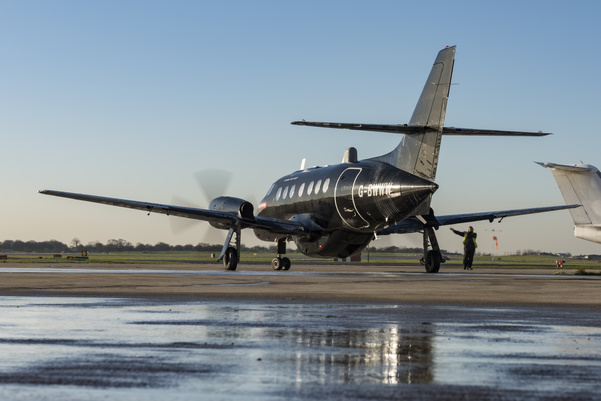
BAE Systems has begun ground-breaking technology trials of unmanned aircraft, using a Jetstream 31 as a ‘flying testbed’.
The trials are part of a collaborative effort from across the UK, with scientists and engineers looking to observe how unmanned aircraft could be integrated into UK airspace.
Using a Jetstream 31 as a ‘flying testbed’ which flies itself, whilst having pilots on board who could take control at any time, the latest trials are being funded by BAE Systems to build on the findings of the ASTRAEA (Autonomous Systems Technology Related Airborne Evaluation and Assessment) Research and Development programme which ran from 2008-2013.
A series of 17 flights will be being conducted from the Company’s military aircraft engineering and manufacturing facility in Warton, Lancashire, UK, which will show the capability, maturity and safe operations of autonomous air technologies. The technology is controlled by satellite-communications, bringing the advantages of ready availability without the need for new infrastructure.
The trials will also test sensing technologies, such as aircraft and cloud avoidance through camera input. Following successful tests, the technology will be used as the basis for the Company’s unmanned aircraft programme.

Over the past two decades, BAE Systems has developed an extensive portfolio of unmanned air capabilities and is currently working on a joint Future Combat Air System programme with Dassault of that is expected to lead to the production of operational demonstrators. While the company has developed Taranis- an unmanned combat aircraft demonstrator in partnership with UK MOD and other engineering organisations.
Maureen Mccue, BAE Systems’ Head of Research and Technology for the military aircraft and information business said: “Our priority as always is to demonstrate the safe and effective operation of autonomous systems and together with NATS we are working towards the possibility of flying our own unmanned systems in a highly controlled environment in the UK. The trials are an exciting time and will give us technology options that could be applied to our own manned and unmanned aircraft as well potentially enabling us to take some new unmanned aircraft technologies to market.”
Alastair Muir, Director, Prestwick, NATS, said: “NATS is always striving to find new and advanced ways to fully support the development and safe use of the ever growing market of unmanned aerial vehicles by all users, hobbyist to professional, within the UK airspace through, for example, our training courses. As such we are very pleased to have supported our BAE Systems colleagues in this trial using aircraft operations of this scale and are currently working with the rest of the industry to agree how this exciting technology can be fully realised and integrated safely with conventional aviation.”
If you would like to join our community and read more articles like this then please click here
autonomous BAE Systems MOD NATS Taranis unmanned unmanned aircraft








